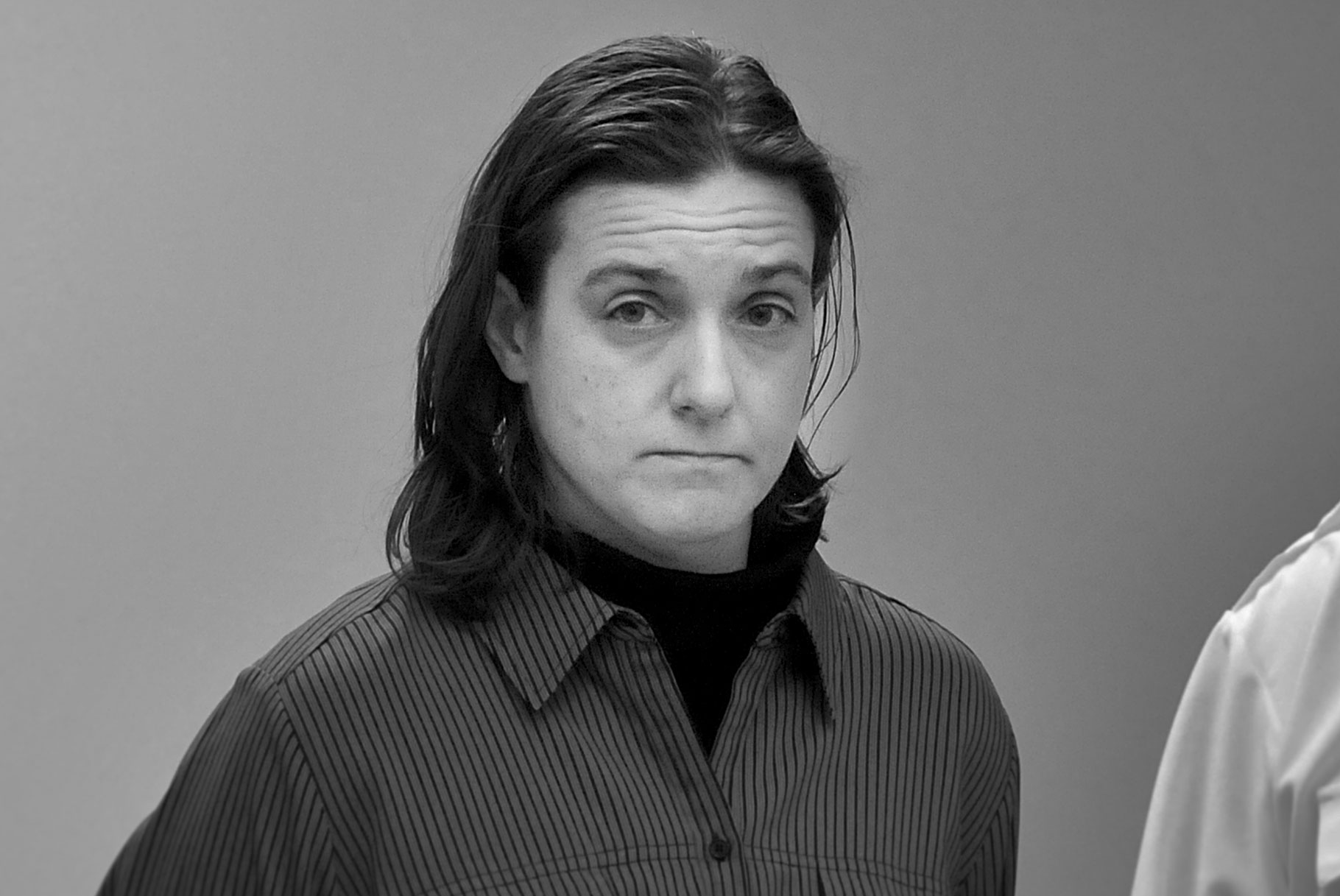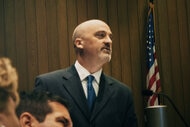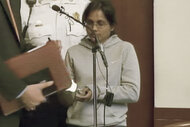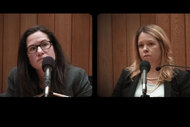Create a free profile to get unlimited access to exclusive videos, breaking news, sweepstakes, and more!
Where Is Sonja Farak, The Lab Technician From ‘How to Fix a Drug Scandal’ Now?
Sonja Farak, tasked with testing confiscated drugs in Massachusetts, was high on the job for years.

Filmmaker Erin Lee Carr’s newest docuseries “How to Fix a Drug Scandal” shines a spotlight on misconduct on several levels but its primary focus is on a Massachusetts former drug lab technician named Sonja Farak.
Farak is one of two Massachusetts drug lab technicians who were caught tainting evidence that was used to convict thousands of defendants on drug charges. Months before Farak’s misconduct came to light in 2013, another lab technician named Annie Dookhan was arrested in 2012 after it became apparent that she wasn’t even testing the drug evidence; rather, she just marked results as positive so that she could impress her colleagues with her speed and efficiency. After their arrests, prosecutors at the Massachusetts Attorney General’s office then tried to sweep their crimes under the rug without addressing how their actions affected the defendants who were convicted based on their drug testing.
While Farak claimed that she did in fact test all the drug evidence thrown her way, unlike Dookhan, she did so under highly questionable circumstances. She would conduct her work high on meth, cocaine, LSD and crack. Her supply came from work itself; she would take drugs and use them and then replace the evidence bags with fake drugs.
Who is Farak?
Farak was born in San Diego, California and within a year her family moved to Newport, Rhode Island after her Navy father was transferred to the east coast. As shown in the docuseries, she testified that her childhood was normal and middle class. Her parents were described as loving, and somewhat strict.
“I was provided for in every way,” Farak testified. “I wasn’t abused and yet I still turned out a certain way, still had some problems.”
Hints of problems to come were not apparent as a child, at least not from the outside.
Farak’s sister Amy Farak said her sister excelled at sports. In fact, she was the first girl in the state of Rhode Island to play high school football in a public school system. This achievement earned her a full page layout in the local paper and some local TV news coverage.
“I want to be accepted like one of them,” Sonja said during the local news segment, included in the docuseries. “ You know, no special treatment.”
She shone academically as well. When Sonja graduated high school in 1996, she didn’t just receive various varsity letters for sports. She was also her class’ co-valedictorian.
"If she puts her mind to something, she can do it,” Amy told the producers of “How to Fix a Drug Scandal.”
Inwardly though, Sonja was struggling. She was struggling to suppress mental health issues, depression in particular, and she tried to kill herself in high school, according to Rolling Stone.
After high school, Sonja went on to major in biochemistry at the Worcester Polytechnic Institute in western Massachusetts. She graduated with high distinction. While attending college, she met her longtime partner Nikki Lee. She remained a football fan, and loved the Patriots.
Sonja got a job as a chemist at the Hinton State Laboratory building in Jamaica Plain after getting her college degree. She worked there for a year but soon realized she wouldn’t make enough money there in the Boston area to buy a house. She looked into the western area of the state because it was less expensive and less hectic. That’s when she found a home working at a lab in the Morrill Science Building on the UMass Amherst campus. She began working there in 2004 and enjoyed that it was more laid back than the job at Hinton. There were also fewer technicians, which made it easier for her drug use to go undetected.
Her addiction
Within a year of working at the new lab, Farak began doing drugs. As the docuseries shows, she admitted to a therapist in 2009 that she had been struggling with addiction issues since 2005. She confided in her therapist that all the drugs she was consuming came from her workplace.
Farak testified that she started off trying meth in the lab because she was "curious.” She admitted that back in college she’d research drugs and noted that meth sounded like one she was particularly interested in trying. When she tried it — she did so when others in the lab went out to lunch — it met her expectations.
She said “it gave me the desired effects. It gave me energy. I felt amazing.”
Her curiosity soon led to a regular drug habit. She started off doing drugs at work regularly — she worked while on meth, liquid amphetamine, LSD, coke and crack.
“I could not imagine being high on liquid methamphetamine and hiding it, day in, day out,” Carr told Oxygen.com, adding that her initial curiosity surrounding Farak kicked off the making of the docuseries. “There was something so tragic but also surreal about this story.”
Carr, who has been public about her past personal battles with alcohol misuse said that it takes both “strength” and a “very specific type of person” to hide such intense substance use for so long.
While Farak kept her drug use isolated to work only at first, her use still spilled out. She started bringing drugs home, and doing them first thing in the morning.
“She suffered from substance misuse disorder and she was in the worst kind of place to try to combat that,” defense attorney Luke Ryan told Oxygen.com. He went to bat for clients who were affected by both Farak and Dookhan’s misconduct. “She really did, at certain times, tried to stop doing this but couldn’t.”
He said he feels she suffered from both a chemical dependency and a psychological dependence to the drugs.
“Those are things that cause people, including my clients, to make choices that negatively impact themselves and others. While I certainly think her longstanding refusal to acknowledge what she was doing comprised the rights of lots of people, I have sympathy for a human being who is struggling with a very difficult addiction,” he said.
Farak’s mishandling of evidence halted in 2013 when she was approached by a state police trooper after some of her drug samples were discovered missing. Fake drugs were found in their place. Farak was in her mid-thirties at the time.
Where is she now?
Farak pleaded guilty to four counts of tampering with evidence, four counts of theft of a controlled substance from an authorized dispensary, and two counts of possession of cocaine in 2014. She was sentenced to 18 months behind bars, followed by five years of probation and 500 hours of community services, the same year. She cried as she was sentenced, Mass Live reported in 2014.
She was released in 2015. In 2018, all of the criminal convictions — more than 10,000 — that Farak worked on were dismissed.
While what she did was wrong, many have been sympathetic to her plight.
“I think it's very painful to be Sonja and I regret having to advocate against her,” Ryan said in the docuseries. “I mean she could have been my client."
Farak has stayed sober, according to the docuseries.
"She isn't on drugs anymore, and I think that that is incredible," Carr, who also directed the true-crime documentaries "I Love You, Now Die" and "Mommy Dead and Dearest," told Women’s Health.
The filmmaker told Oxygen.com that she spent a lot of time thinking about Farak and trying to humanize her.
“I think she’s a good person,” she said. “I think I make a strong case and advocate that humans are fallible and she needs to be given a second chance, but that’s an unpopular opinion, and I can't control how the public reacts to it.”
Carr said she’s been horrified to read angry reactions towards Farak over Twitter. Furthermore, she said she has been grappling with how the docuseries may have affected Farak’s life.
“I can guess that it has been very, very painful for her,” she said. “Yes, it is so exciting to put a series out and I think the series is well-reported and researched but it’s something that happened in the midst of her addiction, and she was incredibly embarrassed about it. It’s almost as if somebody would take the worst part of my life and show it to millions of people.”
The project has brought up questions Carr is still grappling with.
“Am I somebody who took her personhood? I’ve been struggling with that,” Carr said “It’s very uncomfortable and I don’t know what it’s been like for her.”
Carr said that Farak is a private person. While she reached out to her family to let them know that the docuseries was coming out, she hasn’t spoken to Farak and doesn't know much about her current life.
The docuseries did note that Farak is still a fan of the Patriots.
Oxygen.com was not able to reach Farak for comment.


















